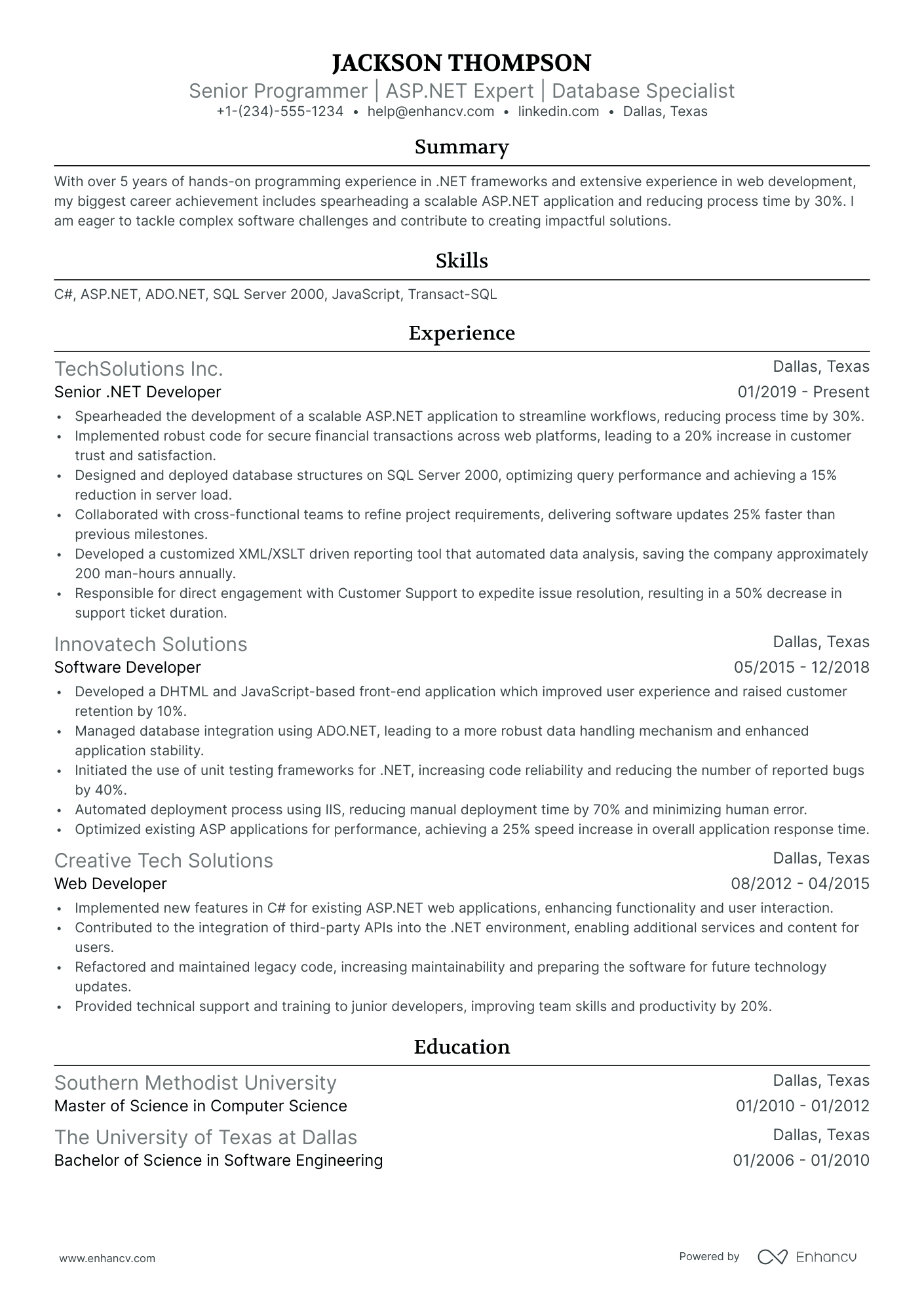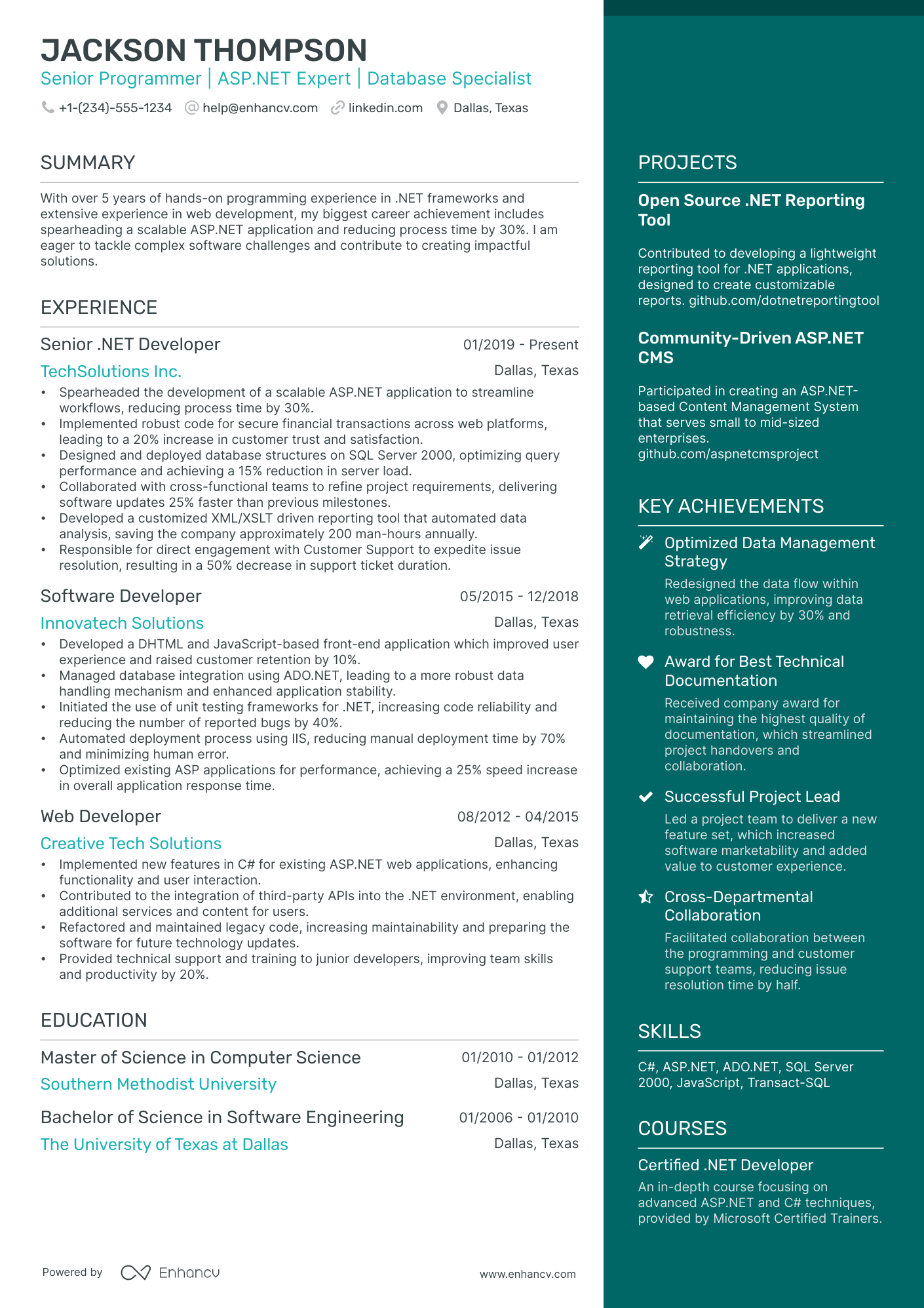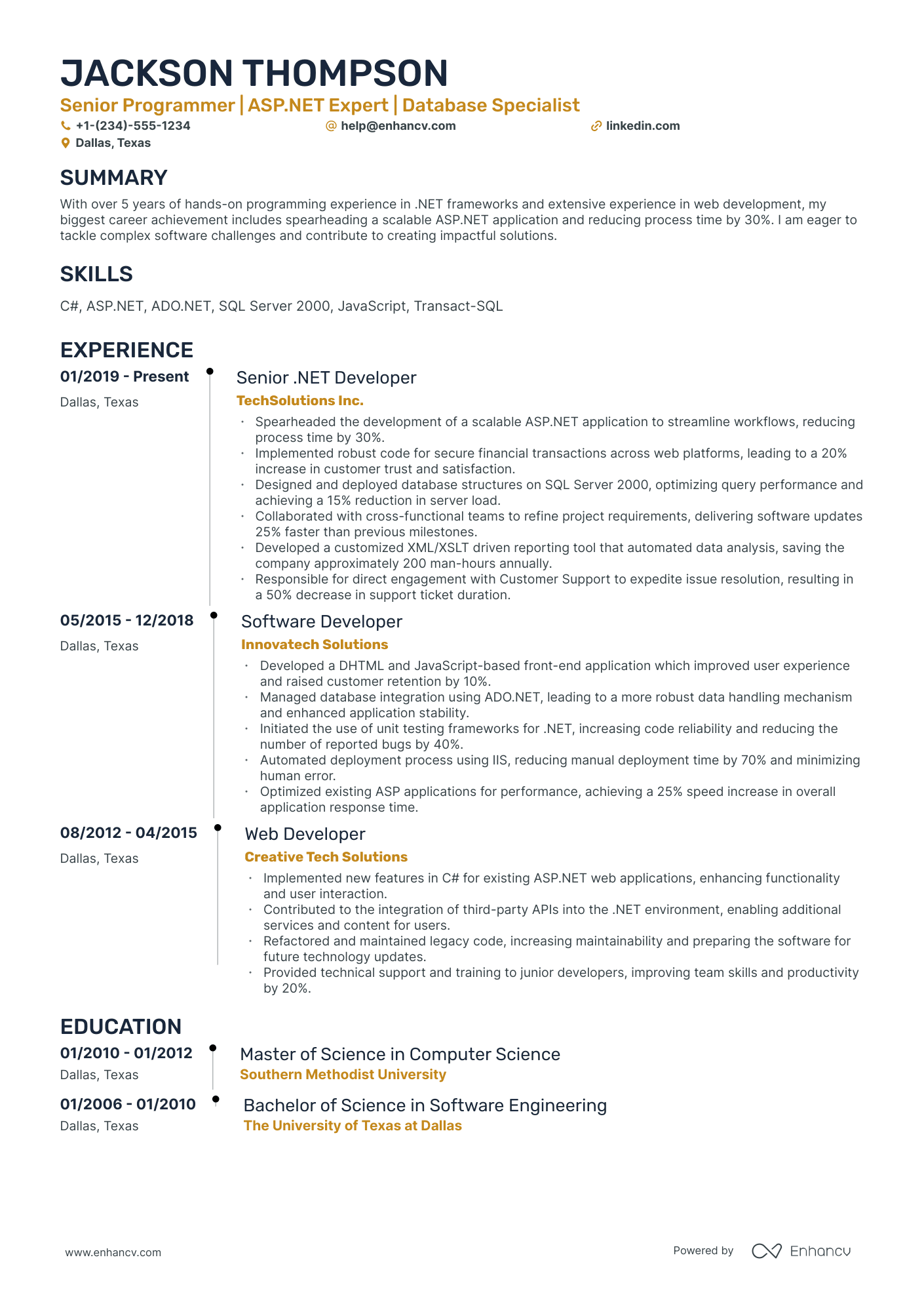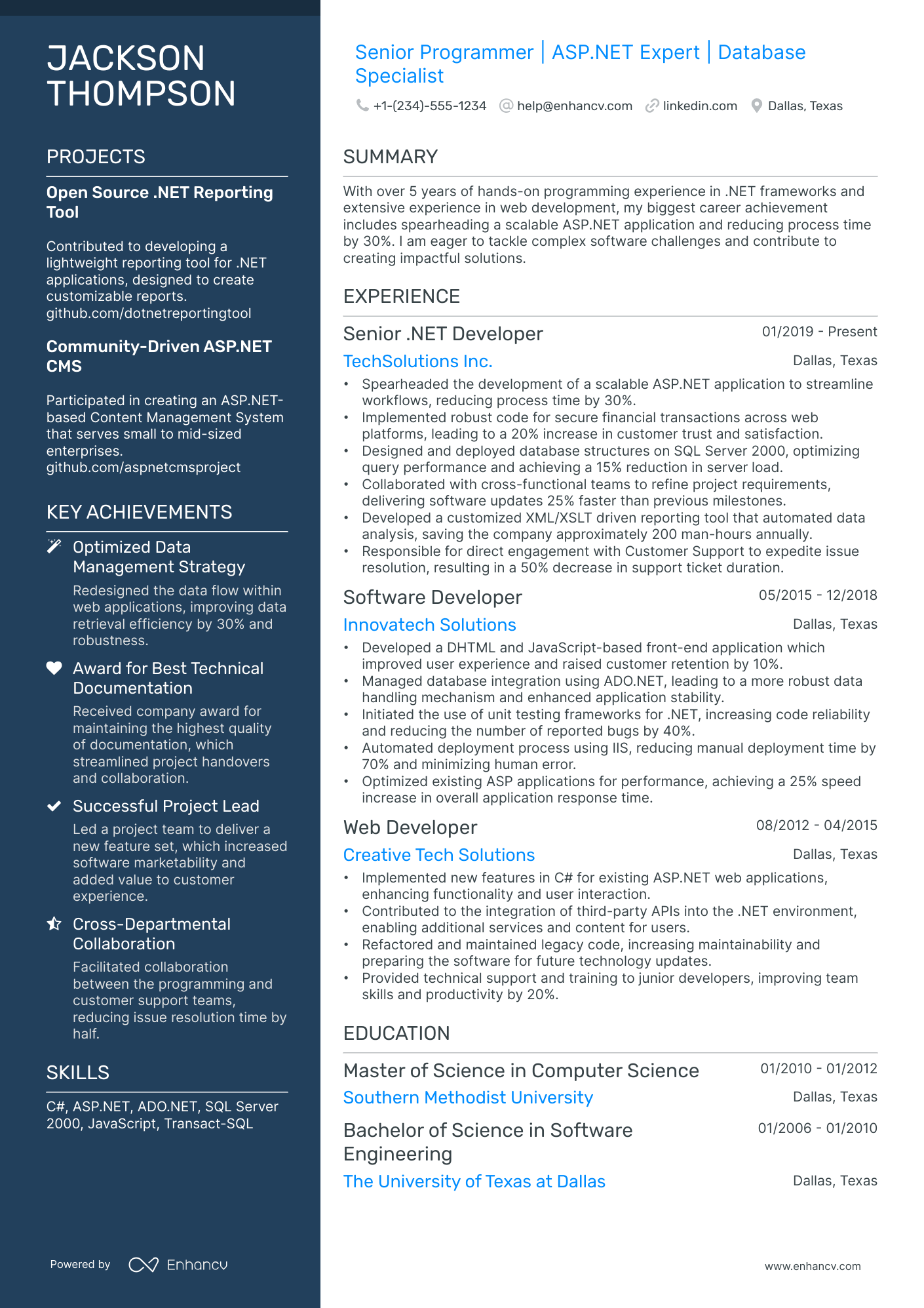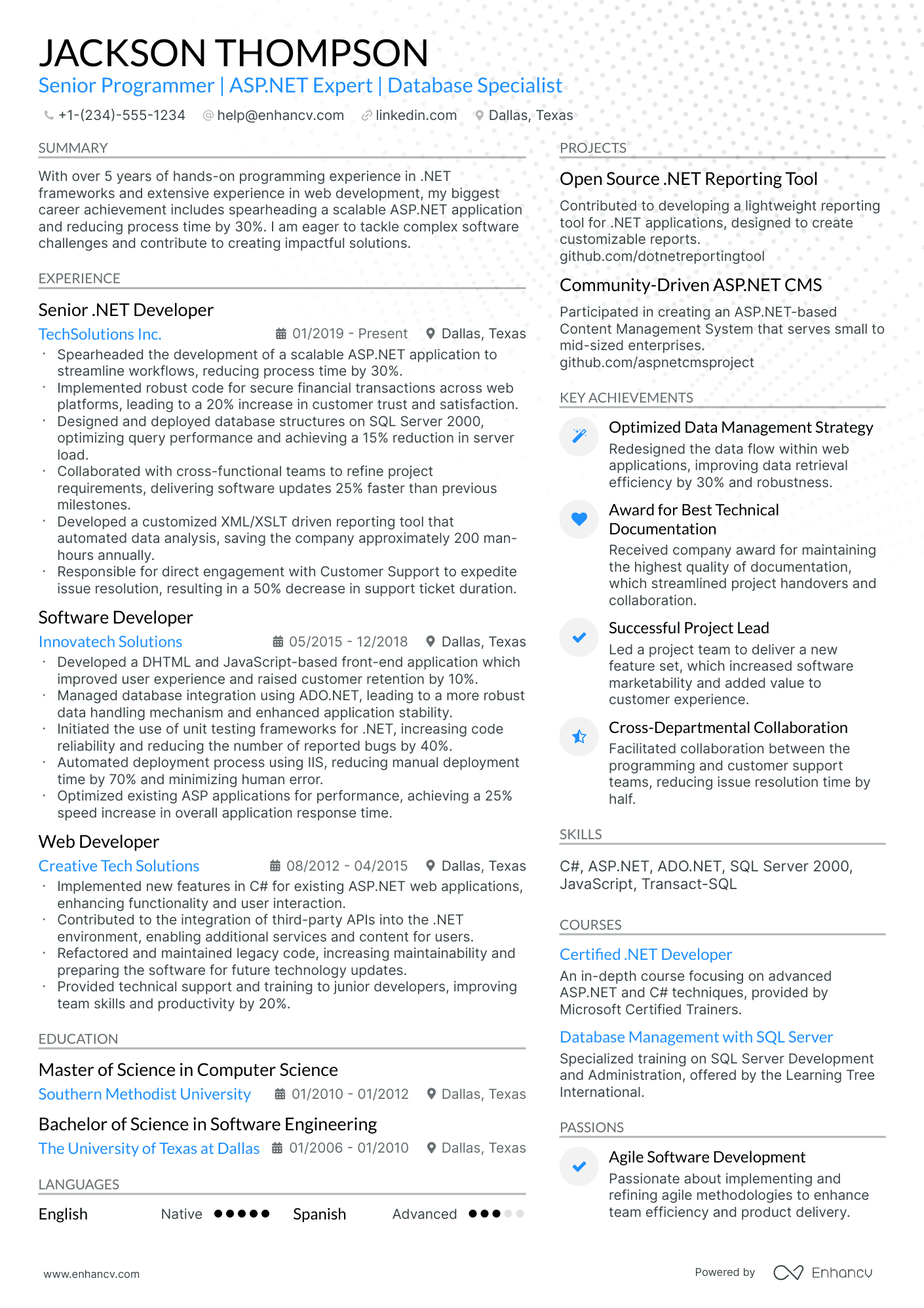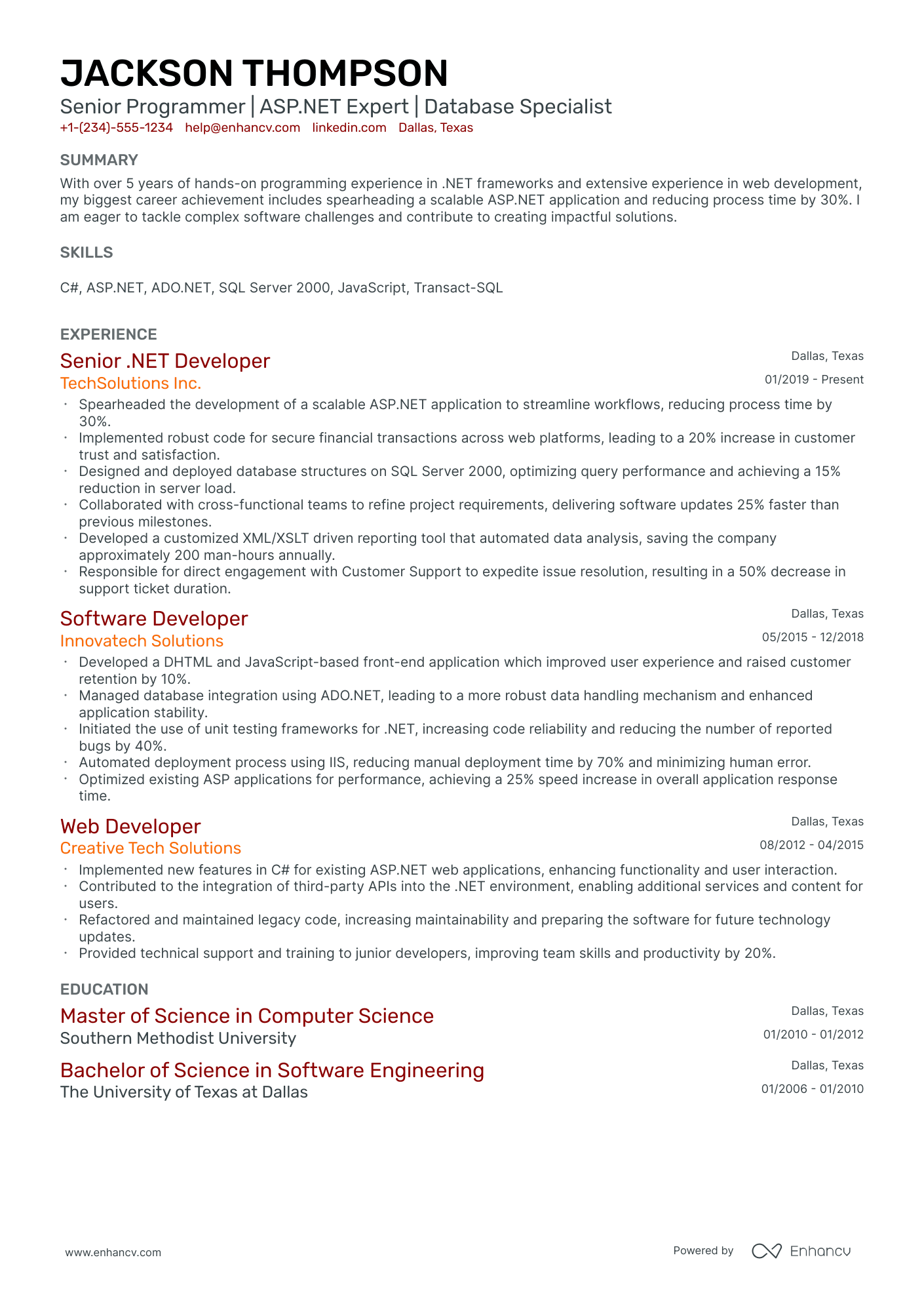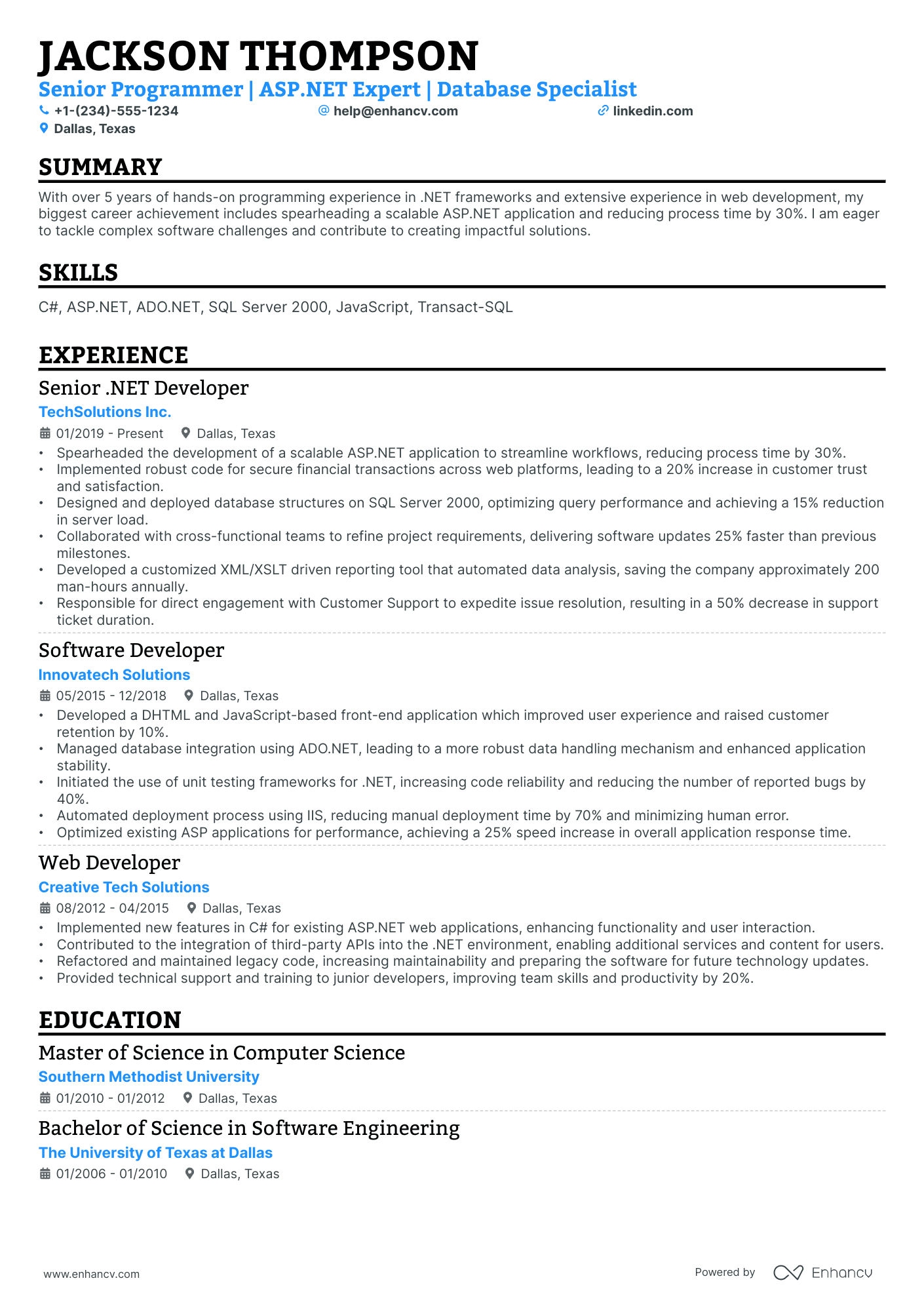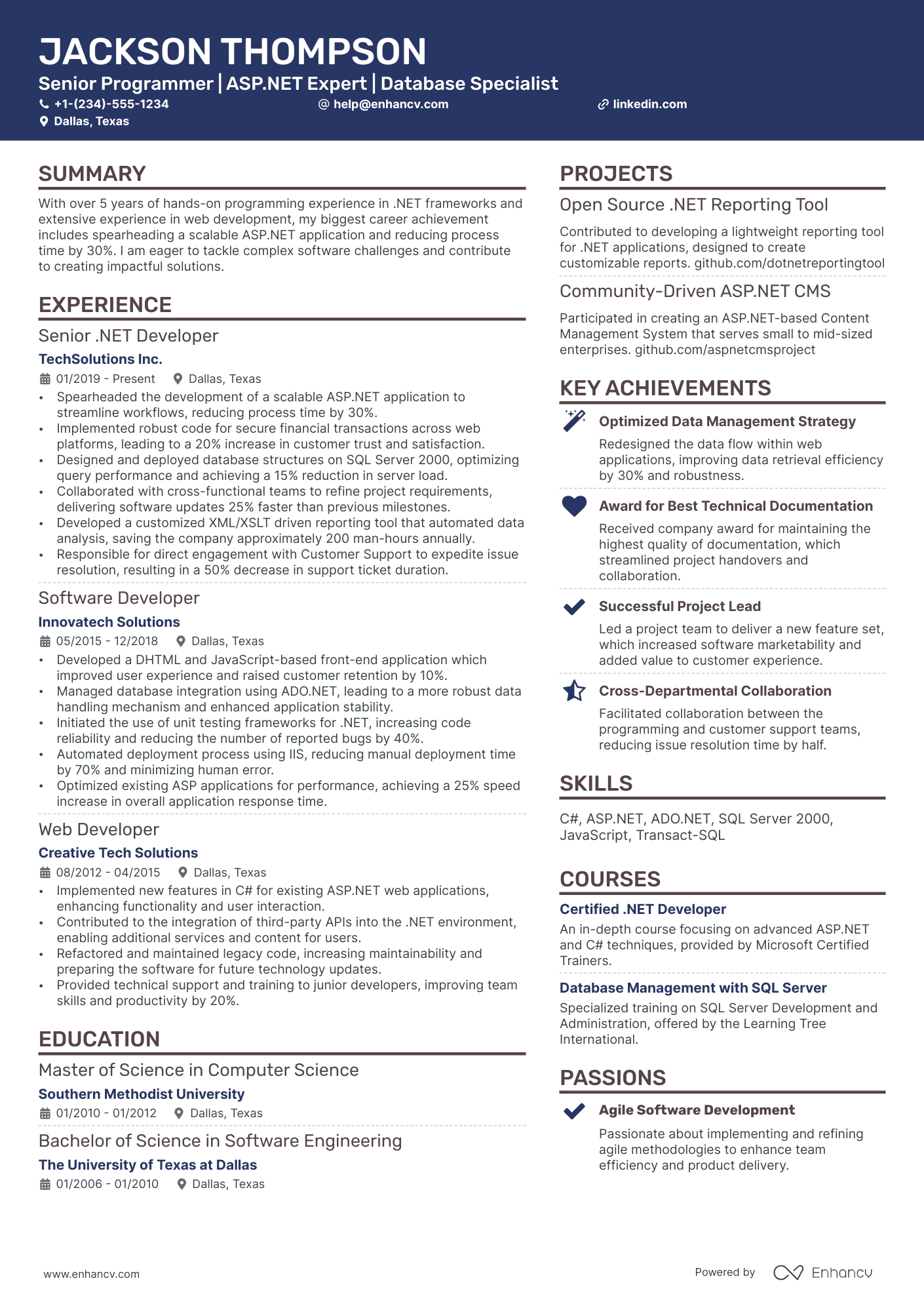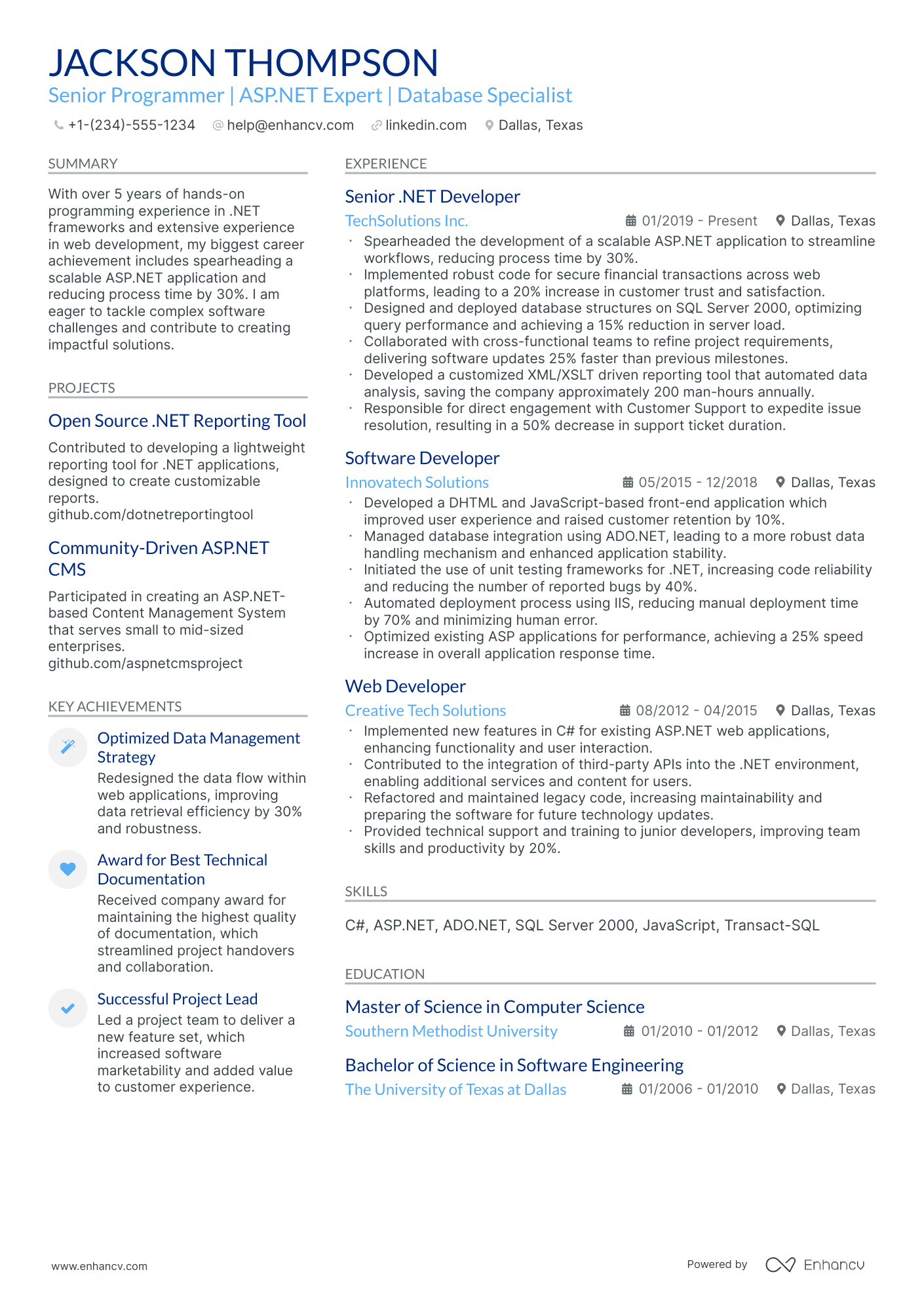As an ASP.NET developer, you may find it challenging to effectively highlight your technical skills amidst a plethora of diverse projects and experiences. Our guide offers tailored strategies to concisely present your expertise, ensuring your resume stands out to recruiters in the technology industry.
- ASP.NET developer resumes that are tailored to the role are more likely to catch recruiters' attention.
- Most sought-out ASP.NET developer skills that should make your resume.
- Styling the layout of your professional resume: take a page from ASP.NET developer resume examples.
How to write about your ASP.NET developer achievements in various resume sections (e.g. summary, experience, and education).
- Software Engineering Manager Resume Example
- Senior Web Developer Resume Example
- Software QA Engineer Resume Example
- Hadoop Developer Resume Example
- Software Test Engineer Resume Example
- Cognos Developer Resume Example
- Director of Software Engineering Resume Example
- Android Developer Resume Example
- Software Consultant Resume Example
- Software Programmer Resume Example
Simple guide to your ASP.NET developer resume format and layout
Successful ASP.NET developer resumes all have one specific characteristic - candidates have invested in a simple resume layout . One that is easy to read, makes a good first impression, and is adapted to their professional experience. There are three distinct resume formats to help you focus on your:
- professional experience - use the reverse-chronological resume format;
- skills and achievements - via the functional skill-based resume format;
- both experience and skills - with a hybrid resume format .
What is more, keep in mind that your resume may be initially assessed by the ATS (Applicant Tracker System) (or the software used by companies in the hiring process). The ASP.NET developer resumes that suit the ATS:
- have a header that includes either a role keyword or the job you're applying for;
- should be no longer than two pages;
- be submitted as PDF, unless specified otherwise.
Different markets have specific resume styles – a Canadian resume, for instance, may require a different approach.
Upload & Check Your Resume
Drop your resume here or choose a file. PDF & DOCX only. Max 2MB file size.
PRO TIP
List your educational qualifications and certifications in reverse chronological order.
The five (plus) definite sections your resume for a ASP.NET developer job should include are:
- Header with your headline, contact details, and/or a preview of your work
- Summary (or objective) to pinpoint how your success aligns with the role
- Experience with bullets of your most relevant achievements in the field
- Skills to integrate vital job requirements (both technical and personal)
- Your further dedication to the field, showcased via relevant higher education and/or certifications
What recruiters want to see on your resume:
- Proficiency in ASP.NET framework, including ASP.NET MVC, Web API, and ASP.NET Core.
- Experience with front-end technologies such as HTML5, CSS3, JavaScript, and popular libraries or frameworks like jQuery, Angular, or React.
- Knowledge of database development, including SQL Server and Entity Framework, and understanding of database design and development principles.
- Experience in object-oriented programming (OOP), design patterns, and software development best practices.
- Familiarity with Visual Studio and version control tools like Git, along with understanding of continuous integration/continuous deployment (CI/CD) processes.
Adding your relevant experience to your ASP.NET developer resume
If you're looking for a way to show recruiters that your expertise is credible, look no further than the resume experience section.
Your ASP.NET developer resume experience can be best curated in a structured, bulleted list detailing the particulars of your career:
- Always integrate metrics of success - what did you actually achieve in the role?
- Scan the ASP.NET developer advert for your dream role in search of keywords in the job requirements - feature those all through your past/current experience;
- Dedicate a bullet (or two) to spotlight your technical capabilities and how you're able to use the particular software/technology in your day-to-day roles;
- Write simple by including your responsibility, a job advert keyword or skill, and a tangible outcome of your success;
- Use the experience section to also define the unique value of working with you in the form of soft skills, relevant feedback, and the company culture you best thrive in.
Industry leaders always ensure that their resume experience section offers an enticing glimpse at their expertise, while telling a career narrative. Explore these sample ASP.NET developer resumes on how to best create your resume experience section.
- Spearheaded the design and implementation of a responsive web application using ASP.NET MVC 5 for a leading insurance provider, improving customer engagement by 30%.
- Streamlined back-end operations by integrating Entity Framework with SQL Server, reducing data retrieval times by 20% and enhancing user experience.
- Collaborated in a cross-functional team and led the adoption of Agile methodologies, improving project turnaround time by 15% while ensuring 95% adherence to deadlines.
- Developed and maintained a high-traffic e-commerce platform using ASP.NET Core and Azure, achieving a 99.9% uptime and processing over 10,000 transactions daily.
- Optimized database operations by implementing caching strategies with Redis, leading to a 25% reduction in page load times and an improved customer retention rate.
- Facilitated the migration of legacy systems to microservices architecture, enhancing system scalability and allowing for a 40% increase in service capacity.
- Directed a team of developers in creating a robust inventory management system for a major retail chain, increasing inventory accuracy by 35%.
- Implemented continuous integration and deployment (CI/CD) pipelines using Jenkins, significantly reducing deployment errors and shortening release cycles by 50%.
- Championed the company's digital transformation initiative, successfully transitioning core business processes to the cloud, subsequently boosting operational efficiency by 20%.
- Contributed to the development of a feature-rich learning management system (LMS) used by over 200,000 users worldwide, contributing to a 60% growth in user adoption.
- Enhanced application security by integrating OAuth 2.0 for authentication, significantly reducing unauthorized access and data breaches.
- Instrumental in optimizing the application's data access layer, which led to a 50% increase in transaction processing speed, directly impacting customer satisfaction.
- Played a key role in the development of a real-time analytics dashboard for a popular sports portal, resulting in a 150% increase in user engagement.
- Lead the refactoring and performance tuning of legacy ASP.NET Web Forms applications, achieving a 40% improvement in response times.
- Collaborated with UI/UX designers to improve the front-end aesthetics with AJAX and JQuery, leading to a 20% decrease in user bounce rates.
- Assisted in developing a comprehensive content management system (CMS) for a leading media company, which supported over 500 editors and content creators.
- Implemented robust logging and error handling mechanisms that reduced system downtime by 60%, ensuring consistent content delivery.
- Contributed to cross-browser compatibility efforts that expanded the website's reach to additional 25% of internet users.
- Developed a reservation and booking system for a major airline, streamlining ticketing processes and expanding online sales by 80%.
- Integrated third-party travel APIs, broadening service offerings and enhancing user options by integrating additional travel services.
- Worked closely with project stakeholders to gather requirements and translate business needs into technical specifications, ensuring alignment with strategic goals.
- Led the frontend and backend development of a custom CRM system for a multinational corporation, increasing sales team productivity by 45%.
- Enhanced mobile user experience by implementing responsive design principles, resulting in a 30% increase in mobile traffic.
- Revamped the data visualization module by utilizing Angular with ASP.NET backend, providing real-time insights that supported strategic decision-making.
The following content includes information from "O*NET OnLine" by the U.S. Department of Labor, Employment and Training Administration (USDOL/ETA). Used under the CC BY 4.0 license. The data represents the top responsibilities present on the task lists for asp.net developer professionals.
Top Responsibilities for Asp.Net Developer:
- Analyze information to determine, recommend, and plan installation of a new system or modification of an existing system.
- Analyze user needs and software requirements to determine feasibility of design within time and cost constraints.
- Confer with data processing or project managers to obtain information on limitations or capabilities for data processing projects.
- Confer with systems analysts, engineers, programmers and others to design systems and to obtain information on project limitations and capabilities, performance requirements and interfaces.
- Consult with customers or other departments on project status, proposals, or technical issues, such as software system design or maintenance.
- Coordinate installation of software system.
- Design, develop and modify software systems, using scientific analysis and mathematical models to predict and measure outcomes and consequences of design.
- Determine system performance standards.
- Develop or direct software system testing or validation procedures, programming, or documentation.
- Modify existing software to correct errors, adapt it to new hardware, or upgrade interfaces and improve performance.
Quantifying impact on your resume
- Include the number of web applications developed using ASP.NET, demonstrating experience and productivity.
- State the percentage reduction in page load times after optimizations, highlighting performance enhancements.
- Mention the number of users supported by your applications, showcasing scalability and user base impact.
- Document the number of bugs fixed or features added in each sprint or release, showing attention to quality and iterative improvement.
- Showcase the dollar amount saved through code refactoring or process improvements, emphasizing cost-efficiency.
- Detail the percentage of code coverage achieved in unit testing, reflecting commitment to robustness and reliability.
- List the number of integrations with other systems or services, indicating experience with complex systems.
- Quantify the reduction in security vulnerabilities post your contributions, proving dedication to security best practices.
Action verbs for your ASP.NET developer resume
What can candidates do about their resume, if they have no experience
Job requirements can sometimes be answered by other elements you could make more prominent in your ASP.NET developer resume.
Thus, you'd be substituting your lack of experience with your relevant:
- Education with details of skills you've obtained that align with the job
- Internships and short-term jobs that are once more dedicated to putting your expertise in the spotlight
- Skills section answering basic and - potentially - more specific job qualifications
- Strengths or accomplishments to show the unique value you present, even as a candidate with less or no professional experience in the industry.
Recommended reads:
PRO TIP
If you happen to have some basic certificates, don't invest too much of your ASP.NET developer resume real estate in them. Instead, list them within the skills section or as part of your relevant experience. This way you'd ensure you meet all job requirements while dedicating your certificates to only the most in-demand certification across the industry.
Defining your unique ASP.NET developer skill set with hard skills and soft skills
In any job advertisement, a blend of specific technologies and interpersonal communication skills is typically sought after. Hard skills represent your technical expertise and indicate your job performance capacity. Soft skills, on the other hand, demonstrate how well you would integrate within the company culture.
Incorporating a balanced mix of both skill types in your ASP.NET developer resume is crucial. Here's how you can do it:
- In your resume summary or objective, incorporate up to three hard and/or soft skills. Make sure to quantify these skills with relevant or impressive achievements; less
- The skills section should list your technical know-how.
- The strengths section is an ideal place to quantify your competencies by focusing on the achievements facilitated by these skills.
Top skills for your ASP.NET developer resume:
ASP.NET
C#
SQL Server
HTML
CSS
JavaScript
MVC
Entity Framework
Web API
Visual Studio
Problem Solving
Communication
Teamwork
Time Management
Adaptability
Attention to Detail
Creativity
Critical Thinking
Collaboration
Self-Motivation
Next, you will find information on the top technologies for asp.net developer professonals from "O*NET OnLine" by the U.S. Department of Labor, Employment and Training Administration (USDOL/ETA). Used under the CC BY 4.0 license.
Top technologies for Asp.Net Developer’s resume:
- Oracle Java 2 Platform Enterprise Edition J2EE
- Oracle SQL Developer
- Blackboard software
- GraphQL
- Apache Spark
- TypeScript
PRO TIP
Bold the names of educational institutions and certifying bodies for emphasis.
ASP.NET developer-specific certifications and education for your resume
Place emphasis on your resume education section . It can suggest a plethora of skills and experiences that are apt for the role.
- Feature only higher-level qualifications, with details about the institution and tenure.
- If your degree is in progress, state your projected graduation date.
- Think about excluding degrees that don't fit the job's context.
- Elaborate on your education if it accentuates your accomplishments in a research-driven setting.
On the other hand, showcasing your unique and applicable industry know-how can be a literal walk in the park, even if you don't have a lot of work experience.
Include your accreditation in the certification and education sections as so:
- Important industry certificates should be listed towards the top of your resume in a separate section
- If your accreditation is really noteworthy, you could include it in the top one-third of your resume following your name or in the header, summary, or objective
- Potentially include details about your certificates or degrees (within the description) to show further alignment to the role with the skills you've attained
- The more recent your professional certificate is, the more prominence it should have within your certification sections. This shows recruiters you have recent knowledge and expertise
At the end of the day, both the education and certification sections hint at the initial and continuous progress you've made in the field.
And, honestly - that's important for any company.
Below, discover some of the most recent and popular ASP.NET developer certificates to make your resume even more prominent in the applicant pool:
The top 5 certifications for your ASP.NET developer resume:
- Microsoft Certified: Azure Developer Associate (Microsoft)
- Microsoft Certified Solutions Developer: App Builder (MCSD: App Builder) (Microsoft)
- Microsoft Certified: Azure Solutions Architect Expert (Microsoft)
- Microsoft Technology Associate: .NET (MTA: .NET) (Microsoft)
- Certified Information Systems Security Professional (CISSP) (ISC)²
The content below includes information from "O*NET OnLine" by the U.S. Department of Labor, Employment and Training Administration (USDOL/ETA). Used under the CC BY 4.0 license. The data represents the top associations for asp.net developer professionals.
Top US associations for a Asp.Net Developer professional
- Association for Computing Machinery
- Association for Information Science and Technology
- Association for Information Systems
- Association for the Advancement of Artificial Intelligence
- Association for Women in Computing
PRO TIP
Showcase any ongoing or recent educational efforts to stay updated in your field.
Recommended reads:
The ideal ASP.NET developer candidate resume summary or objective
You may have heard that your resume top one-third plays an important part in your application.
It basically needs to show strong alignment with the job advert, your unique skill set, and your expertise.
Both the resume summary and resume objective could be used to ensure you've shown why you're the best candidate for the role.
Use the:
- Resume objective to pinpoint your current successes, that are applicable to the field, and your vision for your career. Remember to state how you see yourself growing within this new career opportunity.
- Resume summary as an instrument to pinpoint what is most applicable and noteworthy form your professional profile. Keep your summary to be no more than five sentences long.
At the end of the day, the resume summary or objective is your golden opportunity to shine a light on your personality as a professional and the unique value of what it's like to work with you.
Get inspired with these ASP.NET developer resume examples:
Resume summaries for a ASP.NET developer job
- Seasoned ASP.NET developer with 6 years of robust experience in crafting scalable web applications and services for a leading cloud services provider. Excelled in utilizing C#, ASP.NET MVC, Entity Framework, and SQL Server, contributing to a 30% increase in application performance and customer satisfaction.
- Dynamic former Java Developer transitioning to ASP.NET sphere, bringing forth strong problem-solving skills and a 5-year track record in developing high-volume, mission-critical software. Adept in OOP, keen to leverage extensive backend development background towards mastering .NET technologies.
- Accomplished Software Engineer pivoting into ASP.NET development armed with a solid foundation in Python and JavaScript. Within 8 successful years in software development, eager to utilize transferable coding skills and learn rapidly in a vibrant .NET development setting.
- Passionate entry-level candidate with a Bachelor's degree in Computer Science eager to delve into ASP.NET development. Through academic projects, gained familiarity with C#, .NET frameworks, and web development basics, aiming to become a proficient contributor to modern web solutions.
- Eager new entrant with a fresh perspective, ready to kick-start a career in ASP.NET development. Possesses foundational knowledge of programming concepts, C#, and database management from college coursework combined with a zeal to apply theoretical knowledge in hands-on development scenarios.
Average salary info by state in the US for asp.net developer professionals
Local salary info for Asp.Net Developer.” Source: My Next Move, National Center for O*NET Development. Accessed 10/15/2024
| State | Average Salary (in USD) |
|---|---|
| US National Average | $132,270 |
| California (CA) | $168,660 |
| Texas (TX) | $127,000 |
| Florida (FL) | $122,310 |
| New York (NY) | $145,470 |
| Pennsylvania (PA) | $111,910 |
| Illinois (IL) | $126,200 |
| Ohio (OH) | $107,560 |
| Georgia (GA) | $127,070 |
| North Carolina (NC) | $130,620 |
| Michigan (MI) | $103,830 |
Bonus sections for your ASP.NET developer resume
Looking to show more personality on your ASP.NET developer resume? Then consider including a couple of extra sections.
They'd benefit your application by highlighting your most prominent:
Key takeaways
- Invest in a concise ASP.NET developer professional presentation with key resume sections (e.g. header, experience, summary) and a simple layout;
- Ensure that the details you decide to include in your resume are always relevant to the job, as you have limited space;
- Back up your achievements with the hard and soft skills they've helped you build;
- Your experience could help you either pinpoint your professional growth or focus on your niche expertise in the industry;
- Curate the most sought-after certifications across the industry for credibility and to prove your involvement in the field.
